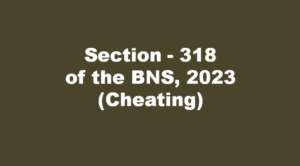Section 318 of BNS, 2023 | Cheating | 420 IPC (old) | Bail Laws
Section 318 of BNS
Section 318 of BNS, 2023 speaks against fraudulent activities, particularly those falling under Section 420 of the IPC.
This article delves into the nuances of Section 318, shedding light on its implications and precedents set by judicial decisions.
Establishing the Grounds: Proof of Deceptive Intent
To invoke Section 318 effectively, it is imperative to substantiate that the complainant relinquished their property on false representation.
The critical element is establishing that the accused harbored a dishonest intention from the inception of the deceptive act.
(Ref : Mobarik Ali, 1958 SCR 328)
Punishment and Bail Provisions for Section 318 of BNS, 2023
Section 318(2) of BNS
(a) Cheating.
(b) Imprisonment for 3 years, or fine, or both.
(c) Non-Cognizable & Bailable Offence.
Section 318(3) of BNS
(a) Cheating a person whose interest the offender was bound, either by law or by legal contract, to protect.
(b) Imprisonment for 5 years, or fine, or both.
(c) Non-Cognizable & Bailable Offence.
Section 318(4) of BNS
(a) Cheating and Dishonestly Inducing delivering of property.
(b) Imprisonment for 7 years and fine.
(c) Cognizable & Non-Bailable offence.
Dishonesty in Relation to Property : Section 318 of BNS
The Supreme Court's interpretation of 'property' within Section 318 challenges conventional notions.
In cases like Ishwarlal Girdharilal (1969) and Abhayanand (1961).
The courts asserted that the term 'property' extends beyond mere monetary value, encompassing items such as assessment orders and examination admission cards.
Varied Perspectives on Cheating
In the case of Adithela Immanuel Raju v State of Orissa (1992 Cr LJ 243) and ANZ Grindlays Bank v Shipping and Clearing (Agent) Pvt Ltd (1992 Cr LJ 77 Cal), illustrate the diverse scenarios where cheating charges were upheld or dismissed.
Each case delves into specific circumstances, establishing the need for a comprehensive examination of intent and consequences.
Timing Matters: SN Palantikar v State of Bihar
In SN Palantikar v State of Bihar (AIR 2001 SC 2960), the court emphasized that the intention to deceive must exist at the time of inducement.
Mere failure to fulfill a promise later does not automatically imply cheating, reinforcing the crucial role of temporal elements in establishing guilt.
Cheating for Dishonored Cheques
Examining cases like Thomas Verghese v P Jerome (1992 Cr LJ 3080 Ker), the article explores the dynamics of dishonored cheques and their implications in cheating allegations.
The court's refusal to quash a complaint underscores the severity of issuing cheques without sufficient funds.
Cheating during Pending of Civil Suit disputed Land
A civil suit for specific performance was already pending against the party who caused the deception. The Court said that criminal proceeding was not to be quashed on that basis alone.
Ref: Vitoori Pradeep Kumar v Kaisula Dharmaiah, 2001 Cr LJ 4948 (SC)
No Criminal Proceedings in Civil Nature disputes
An agreement for sale of land and the earnest money paid to the owner as part consideration and possession of the land having been transferred to the purchasers.
The subsequent unwillingness of the owner to complete the same, gave rise to a liability of a civil nature and the criminal complaint was, therefore, not competent.
Ref: Nageshwar Prasad Singh v Narayan Singh,k (1998) 5 SCC 694)
Conclusion: Navigating the Legal Landscape
Section 318 of BNS, 2023, coupled with its historical ties to Section 420 IPC, paints a complex picture of cheating allegations.
As seen through various judicial pronouncements, the courts emphasize a nuanced approach, considering factors such as intent, harm, and the nature of the property involved.
Navigating this legal landscape requires a meticulous understanding of both statutory provisions and judicial interpretations.
Whenever remedy is available before Civil Court against non-compliance of terms of conditions of the agreement.
Complainant cannot initiate criminal proceedings for an act of civil nature and in such cases ordinarily High Court may grant Anticipatory Bail subject of circumstances of the case.
Frequently Asked Questions
What does Section 318 of BNS deal with?
Answer: Section 318 of BNS deals with cheating and fraudulent acts, previously governed under Section 420 of the IPC.
What must the complainant prove under Section 318?
Answer: The complainant must prove they parted with property due to the accused’s false representation and dishonest intent.
When must the accused have dishonest intention?
Answer: The accused must possess dishonest intent at the very beginning of the deceptive act.
What punishment is prescribed under Section 318(2)?
Answer: Section 318(2) prescribes three years’ imprisonment, or fine, or both for ordinary cheating.
Is the offence under Section 318(2) bailable?
Answer: Yes, Section 318(2) is a non-cognizable and bailable offence.
What does Section 318(3) punish?
Answer: It punishes cheating by someone legally bound to protect the cheated person’s interest.
What is the punishment under Section 318(3)?
Answer: Section 318(3) provides five years’ imprisonment, or fine, or both.
Is the offence under Section 318(3) bailable?
Answer: Yes, it is a non-cognizable and bailable offence.
What does Section 318(4) cover?
Answer: Section 318(4) punishes cheating and dishonestly inducing someone to deliver property.
What punishment is given under Section 318(4)?
Answer: Section 318(4) carries seven years’ imprisonment and fine.
Is Section 318(4) a non-bailable offence?
Answer: Yes, it is cognizable and non-bailable.
How did courts define ‘property’ under Section 318?
Answer: Courts extended ‘property’ to include documents like assessment orders and exam admit cards.
What did SN Palantikar case clarify?
Answer: The court clarified that intention to cheat must exist at the time of inducement.
Can criminal complaint proceed if civil suit is pending?
Answer: Yes, pending civil suit alone does not bar criminal proceedings for cheating.
When can High Court grant anticipatory bail in such cases?
Answer: High Court may grant anticipatory bail if the dispute is of civil nature with existing remedies.
Reference : Criminal Judgments

